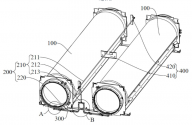You are using an out of date browser. It may not display this or other websites correctly.
You should upgrade or use an alternative browser.
You should upgrade or use an alternative browser.
Chinese semiconductor industry
- Thread starter Hendrik_2000
- Start date
- Status
- Not open for further replies.
Laplace's patent for "semiconductor processing system" was authorized
Tianyancha shows that the "semiconductor processing system" patent of Laplace New Energy Technology Co., Ltd. has been authorized. The authorization announcement date is October 31, and the authorization announcement number is CN219930244U.
The patent abstract shows that the utility model discloses a semiconductor processing system. The semiconductor processing system includes a furnace body, an air inlet pipeline and a balance pipeline. There are multiple furnace bodies, and each furnace body is provided with a furnace cavity and a connection with the furnace cavity. The air inlet channel and the balance channel are connected. The air inlet end of the air inlet pipe is connected to the external air source. The air outlet end of the air inlet pipe is connected to the air inlet channel. The balance pipe is used to connect multiple balance channels to allow multiple furnace cavities. Connected. The structure of this semiconductor processing system is simple, and the reaction conditions in multiple furnaces are consistent. There is little difference in the final product after processing, which improves the uniformity of the product.
Do you mean by SiFive?
StarFive is the one in China
SiFive is actually the one likely mostly impacted by this.
Actually, StarFive is the subsidiary company of SiFive
That's not a hot take. It would be a very rational approach for China to take against ASML. Offer your best products and services or be locked out from this market entirely.In other words ASML will dump their low end machines into China with the intention of undermining any potential development of a lithography industry in China. Of course they are restricted selling their high end machines which also could undermine the overall development of the Chinese semiconductor industry. And to make things worse NONE of these "mature" machines are manufactured or even assembled in China, so this machines could basically be subject to export controls from other countries if the US decide to strangle mature nodes also. Mr Shen sounds like used car salesman here, all the good, none of the downside, a great guy overall and everyone is ok with it.
My hot take is that after China lithography supply chain is completed ASML should be given the option to either find a way sell their best tools in China or sell nothing.
It is kind of complicated. From what I understand StarFive started out as a Chinese company which makes SoCs and systems. With the SoCs using core designs from US company SiFive. But right now they are supposed to be designing their own core designs too.Actually, StarFive is the subsidiary company of SiFive
Whatever happened with Micron in China? They made their play, lobbying USG to lock YMTC out of chip making equipment. They lost that bet so now what? I remember their CEO (an Indian no less) visited China and tried to play up old token plans for a low end half-billion dollar facility in China but it didn't sound like they planned to up their ante with even bigger and more advanced facilities. Are they pretty much locked out of China indefinitely now? Or did they offer up something enough to be allowed back in?
So far they only banned Micron memory on systems sold to the Chinese government and public companies. It could be much worse for Micron. They could just ban its sales on the Chinese market altogether.
Qualcomm thus far hasn't been banned. Which is especially jarring considering this:
They certainly lost a great chance of going against Qualcomm.
Qualcomm thus far hasn't been banned. Which is especially jarring considering this:
They certainly lost a great chance of going against Qualcomm.
Guaranteed that's a backdoor planted by US intel. Given it impacts Xiaomi, Vivo, Oppo, etc. a huge % of China's population is vulnerable to having their private and financial data stolen by the West. Employees of Chinese government and publicly listed entities should have a straight ban on Xiaomi, Vivo, and Oppo phones that use Qualcomm chips. And private entities should informally enact their own bans.So far they only banned Micron memory on systems sold to the Chinese government and public companies. It could be much worse for Micron. They could just ban its sales on the Chinese market altogether.
Qualcomm thus far hasn't been banned. Which is especially jarring considering this:
They certainly lost a great chance of going against Qualcomm.
Too late to edit my old post so I'm going to add that I think Qualcomm was probably one of the topics behind closed doors during the Cali governor's visit. Not sure what China really gets out of continued permissiveness on Qualcomm though, aside from perhaps there not being enough domestic capacity to make that substitution yet. That would be my best guess. So yeah, if you want a secure device, use a Huawei with a HiSilicon chip. Stay far away from the Huaweis that have a Qualcomm chip. That was a sad chapter in this story.So far they only banned Micron memory on systems sold to the Chinese government and public companies. It could be much worse for Micron. They could just ban its sales on the Chinese market altogether.
Qualcomm thus far hasn't been banned. Which is especially jarring considering this:
They certainly lost a great chance of going against Qualcomm.
- Status
- Not open for further replies.
